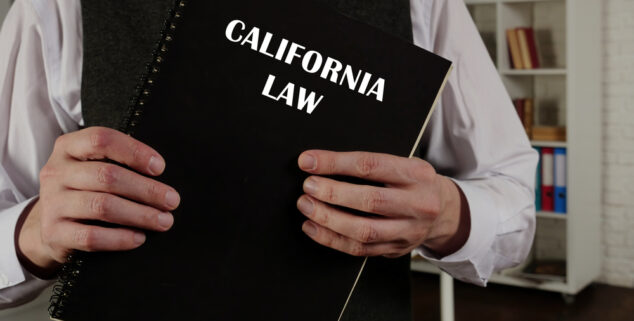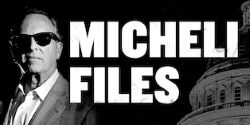Micheli Files
Are all California trailer bills protected against a referendum?
 Image by Yuriy K
Image by Yuriy KSome Capitol observers have posed the question whether budget trailer bills in the California Legislature are “shielded” or protected from a referendum challenge. The answer to this question has not been addressed by the judicial branch, but we can certainly make an educated guess. Let’s consider a few points.
By way of background, Article II, Section 9(a) of the California Constitution provides: “The referendum is the power of the electors to approve or reject statutes or parts of statutes except urgency statutes, statutes calling elections, and statutes providing for tax levies or appropriations for usual current expenses of the State.”
 In addition, Article IV, Section 12(d) and (e) describe appropriations from the General Fund of the State, … and appropriations in the budget bill and in other bills providing for appropriations related to the budget bill. Section 12(e)(2) defines “other bills providing for appropriations related to the budget bill” as consisting only of bills identified as related to the budget in the budget bill passed by the Legislature. This clause sets the stage for budget bills junior and trailer bills.
In addition, Article IV, Section 12(d) and (e) describe appropriations from the General Fund of the State, … and appropriations in the budget bill and in other bills providing for appropriations related to the budget bill. Section 12(e)(2) defines “other bills providing for appropriations related to the budget bill” as consisting only of bills identified as related to the budget in the budget bill passed by the Legislature. This clause sets the stage for budget bills junior and trailer bills.
Pursuant to Prop. 25, which was adopted by the state’s voters in 2010, the Budget Bill and “other bills providing for appropriations related to the budget bill” only require a majority vote for passage on the Assembly and Senate Floors, and they take effect immediately upon enactment. Does this mean that these bills are not subject to a referendum? More specifically, because a trailer bill contains an appropriation, even a nominal amount, and is tied to the Budget Bill, do trailer bills fall within Section 9(a) and, therefore, are exempt from the referendum process?
Unfortunately, the term “appropriations for usual current expenses of the State” is not defined in the state Constitution, nor in statute. While this term has generally been interpreted to mean funding for state government, not all expenses are “usual current,” and so it may be unclear whether every trailer bill is protected from a referendum challenge. How have California courts viewed this exemption from the referendum authority granted to the People of this state?
In a recent case, Wilde v. City of Dunsmuir (2020) 9 Cal.5th 1105, the California Supreme Court considered whether municipal water rates were exempt from referendum. The court stated that, “But to prevent the referendum process from disrupting essential governmental operations, the Constitution exempts certain categories of legislation, including ‘statutes providing for tax levies or appropriations for usual current expenses’ of the government.”
Under this language, a court’s determination would rest upon whether a budget trailer bill is needed to ensure “essential governmental operations” would not be disrupted. The high court in its Wilde decision said, “The question in this case is whether this exemption applies to measures setting municipal water rates. We conclude the answer is yes. Municipal water rates and other local utility charges may be challenged by other means, but they are not subject to referendum.”
California’s high court in Wilde went on to say, “We have previously explained that ‘[o]ne of the reasons, if not the chief reason, why the Constitution excepts from the referendum power acts of the Legislature providing for tax levies or appropriations for the usual current expenses of the state is to prevent disruption of its operations by interference with the administration of its fiscal powers and policies’. (Geiger, supra, 48 Cal.2d at pp. 839–840, 313 P.2d 545.) Referendum, we have explained, poses a distinct potential for disruption that sets it apart from the ordinary legislative process. To give voters an opportunity to propose referendum measures, all legislative enactments subject to referendum must wait some period of time before they take effect.”
With this additional explanation, a court might likely consider the budget bills junior and even budget trailer bills to be part of the state government’s “administration of its fiscal powers and policies” and therefore fall within the constitutional exemption from the People’s referendum power. The Legislature and Administration would certainly argue strenuously in court that a referendum again any budget-related bills would disrupt the essential operations of the state.
In another case, Rossi v. Brown (1995) 9 Cal 4th 688, our Supreme Court similarly stated: “All of the exemptions — for urgency statutes, statutes calling elections, and statutes providing for tax levies or appropriations for usual current expenses of the state — are for ‘measures having special urgency, a delay in the implementation of which could disrupt essential governmental operations.’ For this reason, the court explained, ‘[i]f essential governmental functions would be seriously impaired by the referendum process, the courts, in construing the applicable constitutional and statutory provisions, will assume that no such result was intended’.”
This justification of the exceptions to the referendum power has been consistent for nearly 70 years. Going back to an earlier decision often cited regarding limits on the People’s referendum power, Geiger v. Board of Supervisors of Butte County (1957) 48 Cal. 2nd 832, the Supreme Court opined, “One of the reasons, if not the chief reason, why the Constitution excepts from the referendum power acts of the Legislature providing for tax levies or appropriations for the usual current expenses of the state is to prevent disruption of its operations by interference with the administration of its fiscal powers and policies.”
As a result of these court decisions, it would appear that all budget bills, budget bills junior, and budget trailer bills containing an appropriation would likely not be subject to a referendum because a referendum would be viewed as possibly creating “disruption of the state’s operations” and would amount to an “interference in the state’s fiscal powers and policies.”
One interesting question is whether a referendum, which can be pursued against an entire statute or just part of a statute, could be used to not address the appropriation, but instead the statutory language of a budget trailer bill that contains an appropriation. If this course of action were pursued, the issue that a court would have to decide is whether simply having the appropriation in the trailer bill can be viewed as “part” of the statute (which would not be subject to referendum) and instead allow the actual statutory language to be subject to a referendum.
Want to see more stories like this? Sign up for The Roundup, the free daily newsletter about California politics from the editors of Capitol Weekly. Stay up to date on the news you need to know.
Sign up below, then look for a confirmation email in your inbox.

Leave a Reply